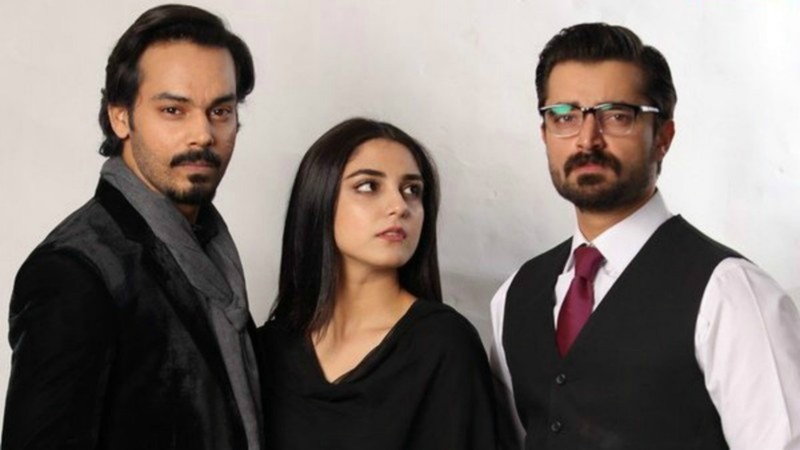TV drama Sang-e-Mar Mar paints an honest picture of Swat's culture
Filmi-style dramas have been in vogue for the past couple of seasons but Hum TV’s Sang-e-Mar Mar bucks the trend, reminding us just how powerful subtlety and detail can be.
Like the recent Udaari, this serial is set on a broad canvas, touching on social issues, exploring the lives of many characters; introducing us to a world as cold and beautiful as the marble in its title.
The recent film Janaan gave us a glimpse of the more liberal side of Pashtun society that many complain is often obscured by fundamentalist stereotypes. Sang-e-Mar Mar however, gives us a snapshot of more conservative and traditional families of Swat.
What Sang-e-Mar Mar is about
The story focuses on the family of Gulistan Khan (Nauman Ejaz), a harsh, cruel man who rules his family with an iron will and wields considerable influence in the area where he lives.
His kinder, gentler wife Shamim (Sania Saeed) is nothing more than a glorified slave who has survived by accepting her husband’s word as if it were the word of God and the good fortune of producing three sons.
The eldest son Safiullah (Omair Rana) is obedient to a fault and his father’s right hand man while middle son Gohar (Agha Mustapha) is the left hand; obedient but depraved and hot-tempered. Aurang (Mikaal Zulfikar) is the youngest, a kind and good-natured person. Just like his mother, he is often disgusted by Gulistan Khan’s behaviour. However, his sister Bano (Uzma Hassan) is as arrogant as her father.
Also part of this mix is Gulistan Khan’s nephew, Tora Khan (Masroor Paras) and his sister Palwasha (Sharmeen Ali). Tora Khan is a man haunted by the traumas of his mother’s death at Gulistan Khan’s hands, the smoldering fires of revenge burn bright in his heart with every fresh humiliation heaped on him by his wife Bano and the rest of his uncle’s family.
When Gohar starts an affair with a girl from a neighbouring village, it sets into motion a spiral of events leading to murder, revenge and even more unforeseen consequences. Saif Ur Rehman (Tipu Sharif) suspects Gohar’s love interest is his sister Shireen (Kubra Khan) and is manipulated into murdering Gohar in the name of honour or ghairat. The naïve Shireen has never even met Gohar; instead, she imagines herself in love with Aurang, who was once her childhood friend.
Shireen is just an innocent victim of circumstance in a society where women are treated like commodities to pay off debts and seal the peace.
Major themes
Writer Mustafa Afridi has given us a wonderfully nuanced and balanced story showing us every facet of the human condition. While Afridi spares nothing in illustrating the restrictive, stifling life that women lead in this highly conservative culture, he balances these realities with touches of softness that are also part of any culture.
Whether it is Durkhaney and Shireen’s sweet friendship, full of jokes and dares or Safiullah's love for his first childless wife, viewers are given a wide perspective. These people are not just cold and rigid, just like all people they are vulnerable and at times surprisingly kind.

While the men in this story appear all-controlling, their seemingly ruthless power in the household is tempered with affection. How many of the sophisticated, urban heroes have we seen on our screens, marry another wife because the first one cannot make parathas/koftas or their secretary/cousin 'forces' the situation on them?
However, in this story of conservative Swat, Safiullah finds the prospect of marrying another woman distasteful and refuses to even acknowledge his new bride, even though his first wife is sick and cannot have children.
As always, Omair Rana brings a lot of depth and nuance to his role, a man who is still a boy, yearning to please his father. Saif Ur Rehman is another case in point; he makes a mistake but in his own way he cares for his sister. In fact, all the men are shown to be very protective of the women in their families.
Religion is a pervasive influence in this story and the way it's manipulated and abused to the advantage of those with power is depressingly familiar.
Tipu Sharif does complete justice to his role as Saif Ur Rehman, another conflicted man, who wants to do right but is maneuvered into a tough situation by a system that values public honour above all else.
Religion is a pervasive influence in this story and the way it's manipulated and abused to the advantage of those with power is depressingly familiar. Just like the rest of us, Afridi’s characters take what is convenient to them from the sharia. So while Gulistan Khan’s business is based on money lending and accrued interest (something forbidden in Islam), he spends a lot of time in prayer and is constantly seen with a tasbih in hand.
Character development at its finest
Nauman Ejaz has become an expert at playing such intense but flawed characters and he creates Gulistan’s persona with great proficiency, giving him a few shades of light along with the heart of darkness.
Sania Saeed is always a good actress but she has been on a roll recently from a knockout performance in ARY’s recent Tum Yaad Aay to this equally well-played portrayal of the simple but wise Shamim.
Is it too early to say Kubra Khan just might be the next Mahira Khan or at least the next bright, young actress to capture the nation’s imagination?
There is a veritable list of excellent performances in this serial. Mikaal Zulfikar finally takes a different role and excels as the hero who cannot quite muster up the courage to actually rebel. Kubra Khan gives a fabulous portrayal as Shireen; not only is she beautiful but like any true star, she has a powerful ability to connect with the audience and has them desperately rooting for her character.
Is it too early to say she just might be the next Mahira Khan or at least the next bright, young actress to capture the nation’s imagination?

Apart from Khan, Mansoor Paras is the other breakout star; he is an absolute delight to watch. At the risk of sounding horribly pretentious, I cannot help but say Paras has saved Tora Khan from what could have been a villainous caricature and brought him to a Shakespearian level of complexity and tragedy.
There is little that can save Tora; he has chosen his path, we should hate him, yet he evokes only pity and at times I just want him to win.
Director Saif Hassan deserves full credit for eliciting such great performances from his entire cast. He has brought this complex, layered story to vibrant life on our screens without confusing the timelines and kept all the tracks relevant without losing the main focus of the story.

Hassan’s approach is minimalist, using the cool, spare quality of light in Swat, blending interior and outdoor locations to avoid the closed effect of melodrama. The utter simplicity and spartan mistrust of any sort of glamour gives this serial all the authenticity that makes even this tale of high melodrama believable.
Yet there are touches of imagination, hopeless dreams, haunting fears and the sweetness of the past that are slipped quietly in between the scenes of the unrelenting present. Ten episodes down and Sang-e-Mar Mar seems only to improve with each episode. This well-written, well made drama has audiences in its thrall, waiting to see exactly what will happen next to its favourite characters.












Comments